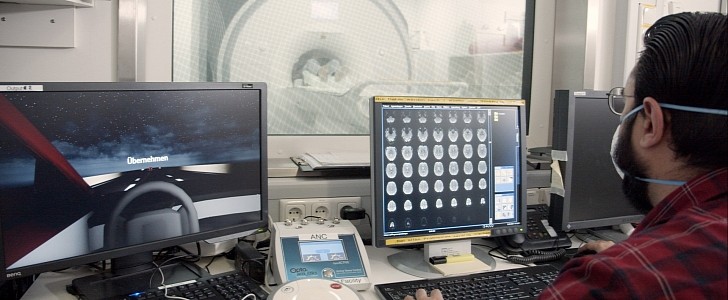The number of road accidents can be significantly reduced by implementing more advanced driver assistance solutions and Ford’s new brain research project may be of great help.
Approximately 25 percent of all road accidents are caused by driver fatigue according to Ford, with drivers failing to follow recommendations when getting behind the wheel. In Europe alone, around 40 percent of them don’t take a break every two hours when embarking on long journeys.
Aware of these worrying percentages, Ford is now working on a solution to detect faster and more accurately when a driver is tired or distracted. In order to accomplish that, researchers are trying to identify the brain responses that reveal lapses in concentration and then match the scans with their physical manifestations. These could be a change in breathing, heart rate, and so on. A wearable device could be used to detect these changes such as heartbeat variability for instance, and if they seem to affect the driver’s concentration, he will be alerted by the car.
Ford is using driving simulation to conduct its tests, while the participants’ brain activity is scanned by an MRI machine. The participant is on a three-lane motorway at night where a car in the middle lane brakes suddenly. Our subjects have to use a handheld device and take over, moving the car to the left or right, while also being prompted by engine sounds that help them know which lane is safe to move to.
Using the MRI, researchers measure the participants’ speed of reaction, their breathing, heart rate, etc., both before and after taking any actions.
Our brain has to do a lot of processing while we are behind the wheel, but nowadays, the driver assistance features in our vehicles do some of the driving for us, which is why we might tend to become more relaxed and let our minds wander. If you add fatigue to the mix, it is oftentimes a recipe for disaster. That is why being able to immediately identify when a driver becomes tired or distracted could be of critical importance, as explained by Stefan Wolter, research engineer at Ford Europe.
Aware of these worrying percentages, Ford is now working on a solution to detect faster and more accurately when a driver is tired or distracted. In order to accomplish that, researchers are trying to identify the brain responses that reveal lapses in concentration and then match the scans with their physical manifestations. These could be a change in breathing, heart rate, and so on. A wearable device could be used to detect these changes such as heartbeat variability for instance, and if they seem to affect the driver’s concentration, he will be alerted by the car.
Ford is using driving simulation to conduct its tests, while the participants’ brain activity is scanned by an MRI machine. The participant is on a three-lane motorway at night where a car in the middle lane brakes suddenly. Our subjects have to use a handheld device and take over, moving the car to the left or right, while also being prompted by engine sounds that help them know which lane is safe to move to.
Using the MRI, researchers measure the participants’ speed of reaction, their breathing, heart rate, etc., both before and after taking any actions.
Our brain has to do a lot of processing while we are behind the wheel, but nowadays, the driver assistance features in our vehicles do some of the driving for us, which is why we might tend to become more relaxed and let our minds wander. If you add fatigue to the mix, it is oftentimes a recipe for disaster. That is why being able to immediately identify when a driver becomes tired or distracted could be of critical importance, as explained by Stefan Wolter, research engineer at Ford Europe.







